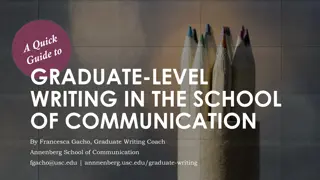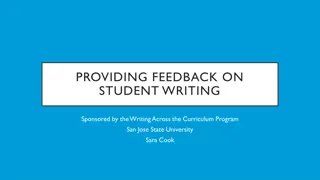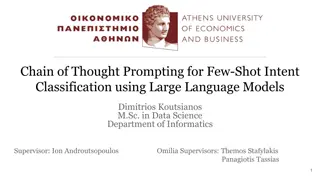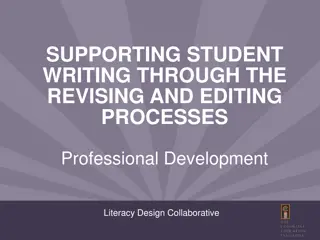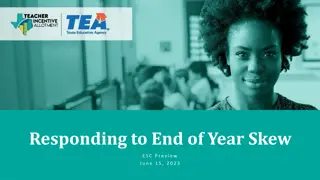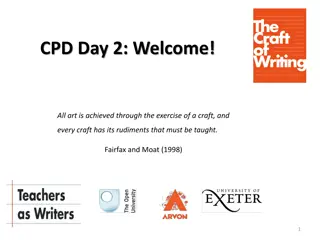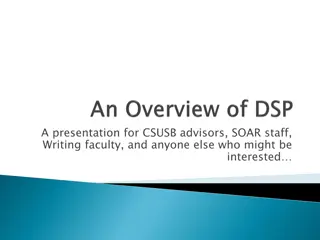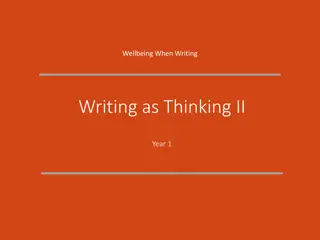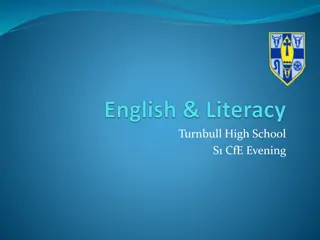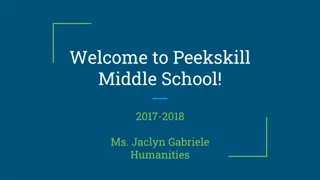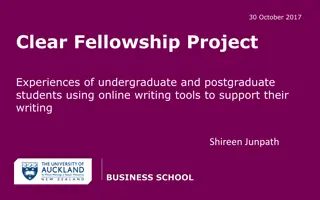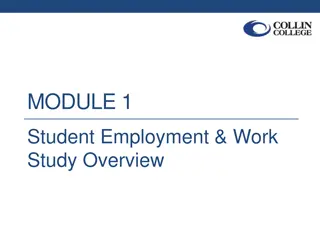Strategies for Prompting Analysis in Student Writing
Explore common challenges students face with analysis in writing, feedback strategies to prompt analysis, and reasons for student struggles. Discover how understanding genre impacts analysis and learn key actions associated with effective analysis according to Bloom's Taxonomy.
Download Presentation

Please find below an Image/Link to download the presentation.
The content on the website is provided AS IS for your information and personal use only. It may not be sold, licensed, or shared on other websites without obtaining consent from the author. Download presentation by click this link. If you encounter any issues during the download, it is possible that the publisher has removed the file from their server.
E N D
Presentation Transcript
Prompting Analysis from your Students Andrea Hamlen-Ridgely & Nicole Cox
1. Identify common problems with analysis and how they manifest in writing. 2. Examine feedback strategies that help to prompt analysis. Goals
Define the term What is analysis? What does analysis look like in writing? What challenges do you have with prompting analysis from your students?
Analysis: Definitions Bloom s Taxonomy: Draw connections among ideas Actions associated with analysis: Differentiate, organize, relate, compare, contrast, distinguish, examine, experiment, question, test Purdue University: Analytical writing requires you view a text or object critically, examining it through an analytical framework. The framework used most often in academic writing is rhetorical: that is, considering the features of a text in relation to the intended effect on its audience. https://www.pfw.edu/offices/learning-support/documents/how-to-write-an-analysis.pdf
Why do students struggle with analysis? 1. Trouble understanding genre and its expectations 2. Missing the step between summary and evaluation 3. Tendency to cling to the obvious 4. Inability to cope with nuance and contradiction
1 Trouble Understanding Genre Anis Bawarshi, Genre & The Invention of the Writer (2003) Rather than teaching students some vague and perhaps questionable notion of what good writing is, a notion that most likely cannot stand up to disciplinary standards or scrutiny, we gain more by teaching students how to adapt as writers, socially and rhetorically, from one genred site of action to the next (156). In other words: Good writing is dependent on the genre and context. Focusing on genre helps students learn to adapt to different writing situations. The genre, or type, of writing assignment is where the work of rhetoric happens. Understanding the genre helps students figure out what to do in the assignment. But what does this have to do with prompting analysis ?
1 Trouble Understanding Genre Anis Bawarshi, Genre & The Invention of the Writer (2003) Genre analysis makes sites of activity and the positions of articulation they frame rhetorically visible and accessible to inquiry (158). In other words: As writers learn different genres, they learn that rhetorical situations and demands change. There isn t just one kind of paper. Memos, reports, proposals, discussion board posts, policy papers, research papers...these are all different genres with different conventions and expectations. Analysis in one does not look quite like analysis in another. Learning how to analyze the genre helps students develop and sharpen rhetorical skills and strategies. When students understand the genre of the assignment, they better understand what it needs, how to approach it, and how to build it. Remember: A superhero film has wildly different conventions than a rom-com.
1 Conventions of the Genre, movies Rom-Com Superhero - - - - - - - - Two love interests start at-odds There s a meet-cute One makes a grand gesture They have a misunderstanding Now there s a love triangle They have a big fight Both people learn something They kiss in inclement weather - - - - - - - - - Origin story of hero Introduce love interest See the villain plotting to destroy the city Hero feels moral obligation to protect Villain attacks the city Love interest gets taken hostage Fight between hero and villain Hero saves the whole world Love interest TBD (because franchise)
1 Conventions of the Genre, academia Reflection or Discussion Board post Research Paper - - - - - - - - Answer an open-ended question Make some kind of connection Cite something for support In conversation with classmates Purpose is to show growth More casual tone 1-2 pages Multiple opportunities to practice - - - Argument or question in specific context Methodology required and explained Use expert sources to build a conversation on the page Engage with and respond to sources or research (maybe a counterargument) Discuss relevance of your contribution Recommendations or a call to action - - -
1 Trouble Understanding Genre How well did this fulfill the conventions of a Discussion Post? Why is spectrum allocation important? Spectrum allocation is important because it is a regulated way of allocating the electromagnetic spectrum to industries and companies that value it most, and balancing that demand with public safety needs.[1]Current technologies are limited in usage of the entire electromagnetic spectrum, so efficient use of the spectrum is beneficial to public and private usage.[2]Traditionally, industry has used the spectrum to further innovation that uses the spectrum more efficiently and is able to adapt much more quickly to efficiently use the spectrum, whereas government has been historically slow to update emergency management technology and homeland defense technology within the spectrum.[3]Spectrum auction is considered the most efficient way to cede spectrum to industry as it can be bid on by the industry with the greatest valuation of that spectrum.[4] How does the fulfillment of those conventions compare to your idea of a good Post? - Answer an open-ended question - Make some kind of connection - Cite something for support - In conversation with classmates - Purpose is to show growth - More casual tone - 1-2 pages - Multiple opportunities to practice
1 Trouble Understanding Genre How well did this fulfill the conventions of a Discussion Post? Why is spectrum allocation important? Warfighters globally depend on a wide range of spectrum capabilities in order to complete diverse, mobile missions, so assured access is critical. Along with evolving threats, the spectrum environment is complex and must be structured to encompass capabilities for efficiency, agility, lethality and flexibility. While much of the discussion about the need for military domination of the spectrum focuses on capabilities that will allow us to out-compete near-peer adversaries, growing private sector demand for increased connectivity means decision makers are constantly balancing the need for economic growth with national security concerns. How does the fulfillment of those conventions compare to your idea of a good Post? - Answer an open-ended question - Make some kind of connection - Cite something for support - In conversation with classmates - Purpose is to show growth - More casual tone - 1-2 pages - Multiple opportunities to practice As Rachel and Tony pointed out in their posts this week, challenges lie in making the appropriate reallocation decisions when determining DoD and other federal user access compared to commercial broadband. Fortunately, spectrum regulators do not support a one-size fits all approach in exploring spectrum efficiency and understand the impracticalities involved with users that utilize a wide range of spectrum- dependent capabilities in mission execution. The question becomes: what kind of policies will allow the US to meet its objectives without compromising on spectrum efficiency? While the specifics of these policies are up for debate, they will likely require robust private/public partnerships.
2 Missing a step Between summary and evaluation, you need analysis. How do you get it? When Harry Met Sally is about two people who drive to New York City together after college graduation and argue about whether men and women can really be friends. They meet a bunch of times over the next twelve years, become friends, and eventually fall in love. It s such a great movie. A modern classic. You should really see it. Understanding the genre will help you analyze the movie: What are the conventions of a rom-com? How or how well did the movie fulfill those conventions? How did the fulfillment of those conventions compare to other rom-coms?
2 Missing a step, example Another issue is that the Air Force currently focuses JPME and educational efforts on only the best and brightest officers. These officers are competitively selected to attend JPME in-residence but the requirements of 21stCentury warfare demand all Air Force officers, Active Duty and Reserve, to be well-educated. Today s globalized world, characterized by complex and continuous military operations, necessitates this, yet Reserve officers are less likely to attend JPME in-residence.viThe Air Force s joint program is cumbersome and at times ambiguous.
2 Missing a step, feedback options Another issue is that the Air Force currently focuses JPME and educational efforts on only the best and brightest officers. Here s a moment of opportunity for deeper examination: how are the best and brightest defined, and by what criteria? These officers are competitively selected to attend JPME in-residence but the requirements of 21stCentury warfare demand all Air Force officers, Active Duty and Reserve, to be well-educated. How are we defining well-educated ? What does that mean, or look like, across professions in the Air Force? Today s globalized world, characterized by complex and continuous military operations, necessitates this. You can offer and strengthen support for this claim by inserting an example or case study of a complex and continuous military operation that requires what you ve determined are well-educated officers. , yet Reserve officers are less likely to attend JPME in-residence.viWhy are they less likely do so? What factors affect that likelihood? The Air Force s joint program is cumbersome and at times ambiguous.Is this a reason or an evaluation? If it s a reason, don t be afraid to give the idea more space - tease out why it s considered cumbersome and ambiguous, and how that contributes to low enrollment. If it s an evaluation, meant to summarize the current state, you ll want to lay out evidence before coming to this conclusion. That way, it ll have more power as an evaluation.
Summary 1 & 2: Preview 3 & 4: 1. Identifying the conventions, expectations, and rhetorical elements of a genre helps students understand what to write and how analysis differs between genres. 3. Students have a tendency to cling to the obvious. 4. Students can have an inability to cope with nuance and contradiction. 2. Analysis is often the missing step between summary and evaluation. To help students add analysis, remind them of genre conventions so they know what to include.
3 Clinging to the obvious Ensuring organizational diversity is a complex problem. The report Diversity, Inclusion, and Equal Opportunity in the Armed Services: Background and Issues for Congress (2019) states that military policies and programs that support diversity, inclusion, and equal opportunity can enhance the services ability to attract, recruit, and retain top talent. In order to have and maintain diversity and inclusion, the target audience must be reached. Recruitment should be the primary goal, but retention is also important. One strategy for recruiting a more diverse officer corps is for the Navy to offer incentives to compete with private industry.
3 Moving beyond the obvious Self-evident: Requires recalling facts; knowledge and comprehension (Bloom) Problematic, but accessible: Non-factual information, information that is not stated or obvious, but can be found and understood by most people; application and analysis (Bloom) Problematic: Requires conjecture and judgment; requires making judgments based on evidence and to determine the value of material based on definite criteria; synthesis and evaluation (Bloom) Wertime s Heuristic (1982)
3 Feedback for moving beyond the obvious Ensuring organizational diversity is a complex problem.How so? What are some of the complexities surrounding this problem? What is known about the challenges of building a diverse organization? What s still up for debate? The report Diversity, Inclusion, and Equal Opportunity in the Armed Services: Background and Issues for Congress (2019) states that military policies and programs that support diversity, inclusion, and equal opportunity can enhance the services ability to attract, recruit and retain top talent. In order to have and maintain diversity and inclusion, the target audience must be reached. Recruitment should be the primary goal, but retention is also important. One strategy for recruiting a more diverse officer corps is for the Navy to offer incentives to compete with private industry.A lot of the information in this paragraph focuses on the idea that the Navy can implement policies that encourage diversity, but the paragraph doesn t give the reader a clear sense of what s problematic or challenging about current diversity initiatives. How and why is the navy failing to attract diverse candidates? What s the larger issue surrounding this failure?
4 Issues with nuance and contradiction Analyze (Bloom s Taxonomy definition): Differentiate, organize, relate, compare, contrast, distinguish, examine, experiment, question, test -definition is key to all of these tasks Example Prompt: Is Great Power Competition a grand strategy? -What is grand strategy? -What is great power competition?
4 Which argument is most nuanced? A. While great power competition offers a catchy slogan, it fails to articulate a clear relationship with US national interests while concurrently confusing ends with ways and means. Thus, Great Power competition is not a grand strategy. B. Great Power Competition is a grand strategy, as it is referenced several times throughout the NSS and service-level publications such as the Commandant s Planning Guidance. However, it lacks a connection between means and ends, which inhibits a coherent formulation of national policies.
4 Analysis means mitigating contradiction Features of war (abstract) Features of war (real) War is apolitical and has its won internal logic of escalating to the extreme. The objectives of war are determined by the political leaders of state, who also determine and calculate the costs and benefits involved War is total, fought without interruption as a zero sum game until one side wins War is not always fought until once side wins.
How would you respond? 4 Prompt: Two nineteenth-century military theorists have shaped the intellectual framework through which the US military conceptualizes and plans for war: Carl von Clausewitz and Antoine Henri Jomini. In this essay evaluate their theories of war. Jomini`s background from the Swiss bank may have given him the advantage of understanding that the number of soldiers impacts the cost of the army. Jomini criticized having a larger army than needed for beating the adversary. The more soldiers, the more the troop costs, and the possibility of losing soldiers are exponential with the size of the force. Mission Command in an early stage can describe Jomini`s idea of how a general should plan the attack and, more importantly, the importance of exploiting the breakthrough of the enemy`s defensive position. Attacking the enemy's weakest point with all the necessary capabilities and planning to maneuver different units in position for the decisive point is essential.
Practices that inhibit analysis When assigning writing (1&2) - Cryptic information about expectations (intended audience, limitations of the prompt, where students should focus energy) When providing feedback (3&4) - Too much feedback - Focusing on sentence-level issues when higher level concerns are at play - Feedback that is too directive - Asking for more analysis without presenting new avenues of inquiry
Decode the prompt: Article review Students choose an article that describes a current IT event or story that illustrates the concepts this course has covered to date; i.e., a topic from Weeks 1, 2 or 3. Students prepare an essay that describes the issue - citing factual sources as well as sources that may illuminate the issues as you now understand them. Students are expected to demonstrate what has been learned! Do NOT just provide excerpts from a current case or legal opinion. This is an opportunity to analyze facts and precedents. The paper shall not exceed 3 pages. In this paper students must demonstrate graduate level writing and comply with the format requirements of the Chicago Manual of Style (CMOS), 17th edition. Careful attention should be given to spelling, punctuation, source citations, references, and the presentation of tables and figures. It is expected that all course work will be presented on time and error free. Take a look at the final paper rubric for guidance as to what we are looking for in papers. This rubric applies to any length paper. However, since it is the one we will be applying to your final paper, it s good to get familiar with it now!
Evaluate this feedback Jomini`s background from the Swiss bank may have given him the advantage of understanding that the number of soldiers impacts the cost of the army. Jomini criticized having a larger army than needed for beating the adversary.This sentence is difficult to follow. Is Jomini criticizing the army?The more soldiers, the more the troop costs, and the possibility of losing soldiers are exponential with the size of the force. I think you re saying the possibility of losing soldiers increases exponentially with the size of the force.Mission Command in an early stage can describe Jomini`s idea of how a general should plan the attack and, more importantly, the importance (more importantly, the importance of is redundant)of exploiting the breakthrough of the enemy`s defensive position.This sentence doesn t seem to directly progress from the previous sentence.Attacking the enemy's weakest point with all the necessary capabilities and planning to maneuver different units in position for the decisive point is essential.Tell me more. This paragraph provides information about Jomini s theory but doesn t provide analysis of the theory.
Feedback Revised Jomini`s background from the Swiss bank may have given him the advantage of understanding that the number of soldiers impacts the cost of the army. Jomini criticized having a larger army than needed for beating the adversary.The more soldiers, the more the troop costs, and the possibility of losing soldiers are exponential with the size of the force. Mission Command in an early stage can describe Jomini`s idea of how a general should plan the attack and, more importantly, the importance of exploiting the breakthrough of the enemy`s defensive position. Attacking the enemy's weakest point with all the necessary capabilities and planning to maneuver different units in position for the decisive point is essential.This paragraph is effective in summarizing some of the tenets of Jomini s theory, but it doesn t tell the reader what is particularly useful or problematic about the theory. That is, how might Jomini s ideas help us to better understand war? Who might benefit from this theory? Conversely, are there instances in which this theory is problematic or could impede our understanding of war?
Strategies for Prompting Analysis Before assigning writing - - Discuss the prompt with students Explain genre, expectations, where to focus energy When responding to writing - - - - - Steer students away from the obvious Ask Why? How? and So what? questions Encourage perspective-taking Help students define terms, develop nuance, and wrestle with contradiction Remind students to give problems exigency ( Who cares? )
Prompt: Is the professional military ethic static and unbending, or is it dynamic and responsive to changes in a nation s society and culture? Since 1776, U.S. society has changed, which includes the services provided by the government. Too broad. Start with a sentence about the military.Today s military has evolved dramatically from the Revolutionary War tied to the evolution of the demands from society, expectations from their military members, and the hopes of the citizenry who are relying upon [ ] integrity and skill . Therefore, professional military ethics is not static and must be responsive to the changes in the nation s society and culture to maintain the sacred trust, as the men and women who serve across the DoD are at the service of the nation and its citizens. How are you drawing this conclusion from the previous sentence? The DoD will follow the lead of society or be prepared for direct intervention (thereby fracturing trust). This is highlighted in Armed Forces Officer, Swain & Pierce state: Society, especially in a democratic political system, always reserves the right to intervene when it thinks that military values and practices should change to conform to public norms (Swain & Pierce, p. 21).This paragraph starts quite broad and then eventually makes its way to talking about shifting ethics in the military. However, the ideas you present about military ethics are largely reliant on directly quoted material from another source. It s ok to provide source material to support your ideas, but I would like to see more of your own thoughts here.
Revised feedback Since 1776, U.S. society has changed, which includes the services provided by the government. Today s military has evolved dramatically from the Revolutionary War tied to the evolution of the demands from society, expectations from their military members, and the hopes of the citizenry who are relying upon [ ] integrity and skill . Therefore, professional military ethics is not static and must be responsive to the changes in the nation s society and culture to maintain the sacred trust, as the men and women who serve across the DoD are at the service of the nation and its citizens. The DoD will follow the lead of society or be prepared for direct intervention (thereby fracturing trust). This is highlighted in Armed Forces Officer, Swain & Pierce state: Society, especially in a democratic political system, always reserves the right to intervene when it thinks that military value and practices should change to conform to public norms (Swain & Pierce, p. 21) It feels like this paragraph might be conflating two different issues: Whether the US military has changed and whether the military should, in the present, continue to be responsive to changes in society. It also seems to define change broadly towards the beginning of the paragraph and then gradually works its way to changes in military ethics. As you revise, you might want to be more specific as to how you re defining change (change in regulations, change in culture, change in ethics) here. Finally, the paragraph is heavily reliant on direct quotes from other sources, but it s not always clear as to what you want the reader to make of these quotes. For instance, with regard to the Swain and Pierce quote at the end of the paragraph, do you agree with Swain and Pierce? If so, what are the implications for your argument?
To Summarize Why do students struggle with analysis? 1. Trouble understanding genre and its expectations 2. Missing the step between summary and evaluation 3. Tendency to cling to the obvious 4. Inability to cope with nuance and contradiction
Discussion & Workshopping Feedback Share a piece of feedback you ve given, or are planning to give, to a student. Ask any lingering questions you have about feedback practices that help students to work towards analysis. Share a success story: What have you done in the past that has helped a student move forward with analysis?
Thank you! Questions? andrea.hamlen@usmcu.edu nicole.d.cox.ctr@ndu.edu






